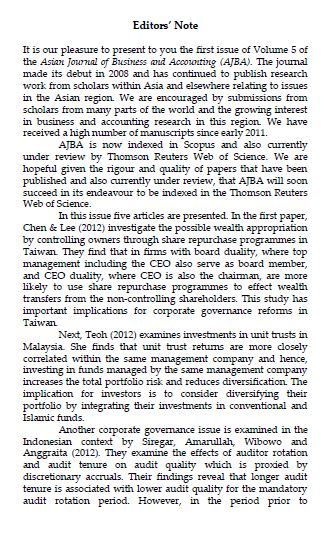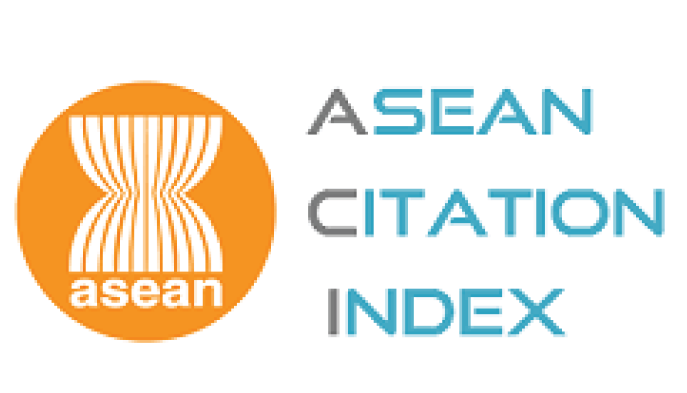Editor's Note
Abstract
It is our pleasure to present to you the first issue of Volume 5 of the Asian Journal of Business and Accounting (AJBA). The journal made its debut in 2008 and has continued to publish research work from scholars within Asia and elsewhere relating to issues in the Asian region. We are encouraged by submissions from scholars from many parts of the world and the growing interest in business and accounting research in this region. We have received a high number of manuscripts since early 2011.
AJBA is now indexed in Scopus and also currently under review by Thomson Reuters Web of Science. We are hopeful given the rigour and quality of papers that have been published and also currently under review, that AJBA will soon succeed in its endeavour to be indexed in the Thomson Reuters Web of Science.
In this issue five articles are presented. In the first paper, Chen & Lee (2012) investigate the possible wealth appropriation by controlling owners through share repurchase programmes in Taiwan. They find that in firms with board duality, where top management including the CEO also serve as board member, and CEO duality, where CEO is also the chairman, are more likely to use share repurchase programmes to effect wealth transfers from the non-controlling shareholders. This study has important implications for corporate governance reforms in Taiwan.
Next, Teoh (2012) examines investments in unit trusts in Malaysia. She finds that unit trust returns are more closely correlated within the same management company and hence, investing in funds managed by the same management company increases the total portfolio risk and reduces diversification. The implication for investors is to consider diversifying their portfolio by integrating their investments in conventional and Islamic funds.
Another corporate governance issue is examined in the Indonesian context by Siregar, Amarullah, Wibowo and Anggraita (2012). They examine the effects of auditor rotation and audit tenure on audit quality which is proxied by discretionary accruals. Their findings reveal that longer audit tenure is associated with lower audit quality for the mandatory audit rotation period. However, in the period prior to
mandatory audit rotation, longer audit tenure is associated with higher audit quality. These findings suggest that regulators need to re-examine the policy directives on audit firm rotation.
This is followed by Utama (2012) who investigates whether the extent of company disclosure in Indonesia is affected by competition in addition to internal corporate governance mechanisms. She finds that corporate governance mechanisms, competition and size are positively related to company disclosure levels. The study also evidences the existence of alignment and entrenchment effects at differing levels of blockholder ownership.
The final paper by Idris (2012) discusses using a case study, the effects of globalisation on small businesses in Malaysia. She suggests measures to enhance Malaysian small businesses’ sustainability in a highly globalised environment.
In conclusion we thank all our area editors, members of the editorial board and advisory board and reviewers for their continued support and encouragement. We are also grateful to the Malaysian Accountancy Research and Education Foundation (MAREF) for their financial support. We hope this issue brings AJBA closer to achieving its mission to incrementally provide a voice for scholars embarking on Asia-focused research.
Downloads








